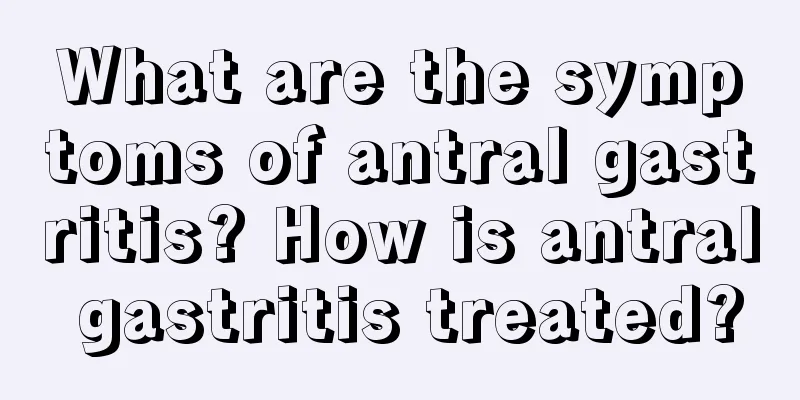What are the symptoms of antral gastritis? How is antral gastritis treated?

|
Antral gastritis is a common chronic gastrointestinal disease in life. The incidence of this disease is often related to people’s mental state. That is to say, if people’s emotions fluctuate too much or they are extremely fearful and nervous, the condition is likely to worsen. So what are the specific symptoms of antral gastritis? What are the symptoms of antral gastritis? 1. Stomach bloating: Feeling bloated in the stomach, indigestion, or bloating, appetite blockage, and inability to swallow food. About 70% of patients with antral gastritis have this symptom. 2. Stomachache: Sometimes it hurts before meals, sometimes it hurts after meals, and some people even feel the pain in the middle of the night. The stomach pain may not feel severe, but rather dull pain, tenderness or muffled pain, and the location of the stomach pain is between below the heart and the belly. About 85% of patients with antral gastritis have this symptom. 3. Heartburn: Congestion of the gastric mucosa and excessive stomach acid can cause heartburn, which is mainly a feeling of burning and fever in the stomach. 4. Acid reflux: Excessive stomach acid, frequent acid reflux, and a feeling of stomach acid rising or filling up in the stomach. About 50% of patients with antral gastritis have this symptom. 5. Loss of appetite: no appetite, unable to eat, or wanting to eat but not daring to eat when seeing food. 6. Weight loss: Some patients with stomach problems feel that their appetite is still good and they can eat, but they become thinner and lose weight day by day. This shows that their digestive function is not good. Although they eat, they cannot fully absorb the food. 7. Cold stomach: Many patients with stomach problems dare not eat cold food, or they will have stomach pain and diarrhea when the weather turns cold and the temperature drops. 8. Bad breath and black tongue coating: Patients with stomach problems often experience symptoms such as bad breath, bitter taste in the mouth, and black tongue coating, accompanied by stomach pain and bloating. How to treat antral gastritis? 1. Eradication of Helicobacter pylori The symptoms of antral gastritis should be classified as functional dyspepsia. Currently, eradication treatment is generally used for functional dyspepsia that is positive for Helicobacter pylori. Therefore, Helicobacter pylori should be eradicated in all patients with Helicobacter pylori-positive chronic non-atrophic gastritis and dyspepsia symptoms. 2. Internal medicine drug treatment Patients with chronic gastritis and bile reflux can use prokinetic drugs or gastric mucosal protective agents that bind bile acid. For patients with symptoms such as gastric mucosal erosion, acid reflux, and upper abdominal pain, antacids, H2 receptor antagonists, or proton pump inhibitors can be selected according to the condition or severity of the symptoms. Prokinetic drugs can be used for patients whose main symptoms are upper abdominal fullness, nausea or vomiting. Gastric mucosal protective agents are used for patients with bile reflux, gastric mucosal damage or obvious symptoms. Antidepressants or antianxiety drugs can be used for patients with chronic gastritis and dyspepsia symptoms with obvious psychiatric factors. In addition to their symptomatic therapeutic effects, the above-mentioned drugs may also have certain effects on gastric mucosal epithelial repair and inflammation. 3. Surgery If the effect of internal medicine medication is not satisfactory, you should continue to try it for a few months before deciding to have surgery or reoperation. For patients with severe reflux symptoms who are unresponsive to medical treatment, surgical treatment may be considered. The commonly used surgical method is gastrojejunostomy. After the diversion operation, gastrointestinal reflux can be completely eliminated, mucosal inflammation can be reduced or disappear, and early symptoms are also significantly improved. However, in long-term follow-up, 30%-50% of patients have recurrence of symptoms, and the reason is still unclear. 4. Traditional Chinese Medicine The treatment principle of traditional Chinese medicine is to descend qi and resolve phlegm, invigorate qi and harmonize the stomach, promote qi circulation and relieve pain. You can use Xuanfu Daizhe Decoction by Zhang Zhongjing. The original prescription is from Treatise on Febrile Diseases. It was originally used to treat "febrile disease with sweating, vomiting, diarrhea, and recovery, followed by a hard and lumpy feeling under the heart and persistent belching." Indications: Weak stomach qi and internal obstruction of phlegm. There is a hardness and distension under the heart and belching that cannot be stopped. Clinical application: gastric reflux, vomiting of saliva, and belching. |
<<: Kidney disease can not eat these fruits, will aggravate the condition
>>: 9 kinds of juice recipes, healthy and beauty-enhancing!
Recommend
Can people with yang deficiency eat Ganoderma lucidum? What should they pay attention to?
Many women will experience various symptoms such ...
Treatment of acute mastitis
Subacute mastitis, both women and men have a cert...
What are the best exercises for girls to lose weight?
In modern life, obesity has become an important f...
There is a lump and pain when pinching the chest
Female friends are very afraid of suffering from ...
How many words can you use to describe the Bund in Shanghai? Which is bigger, Shanghai or Beijing?
Shanghai is an important city in my country. It p...
Why is the leucorrhea yellow and painless?
Due to some reasons, our bodies often suffer from...
How to maintain the uterus after medical abortion?
Nowadays, many people always ignore their physica...
How to treat breast nodules?
Breast health risks are still very common in life...
Women's menopause age
Many female friends have to face a desperate situ...
Ovulation bleeding method
A woman's ovulation period is the best time t...
What is the cup size of a size 34 bra? What is the approximate chest size of a size 34 bra?
For girls, it is quite embarrassing if they don&#...
Menopause after age 55 increases breast cancer risk
Nowadays, many female friends in their 40s take e...
How to prevent weight gain by taking estrogen
When there is a problem with our body, we may be ...
Why do we add sesame oil to hot pot? Characteristics of sesame oil
Sesame oil contains essential unsaturated fatty a...
33 weeks pregnant, hard and tight stomach
Women will encounter various problems during preg...









